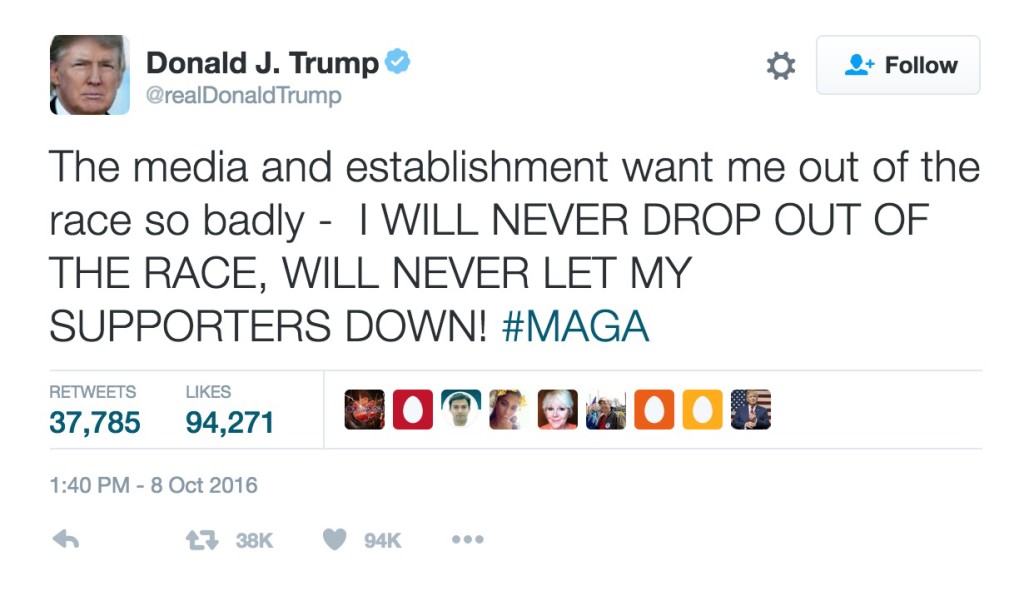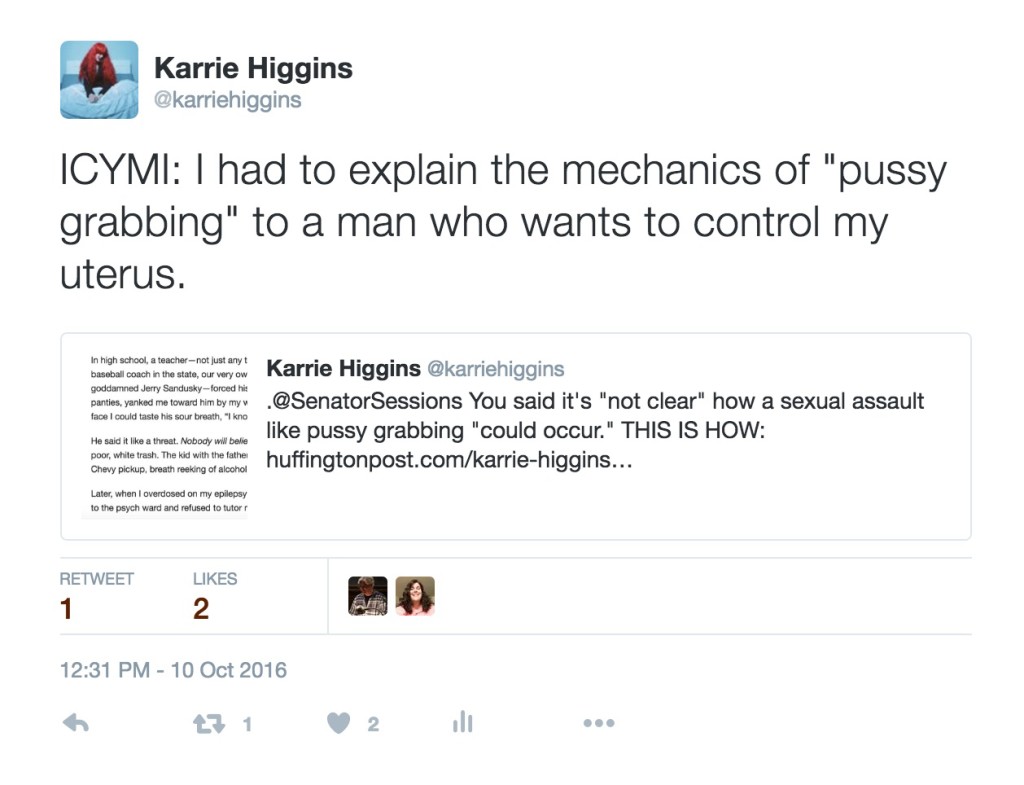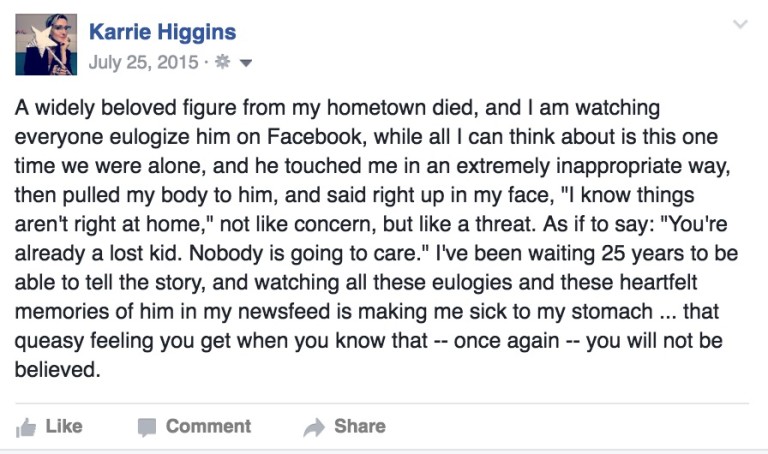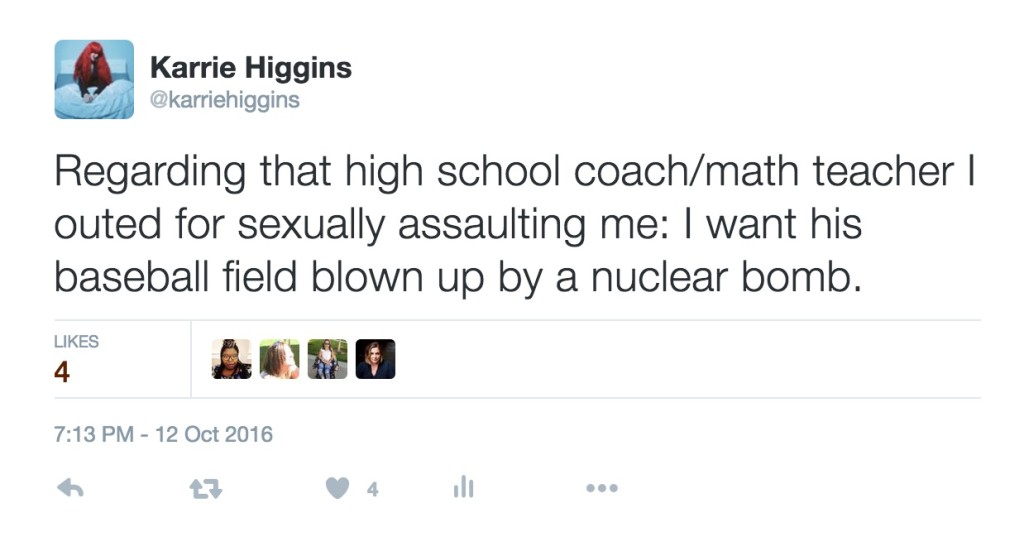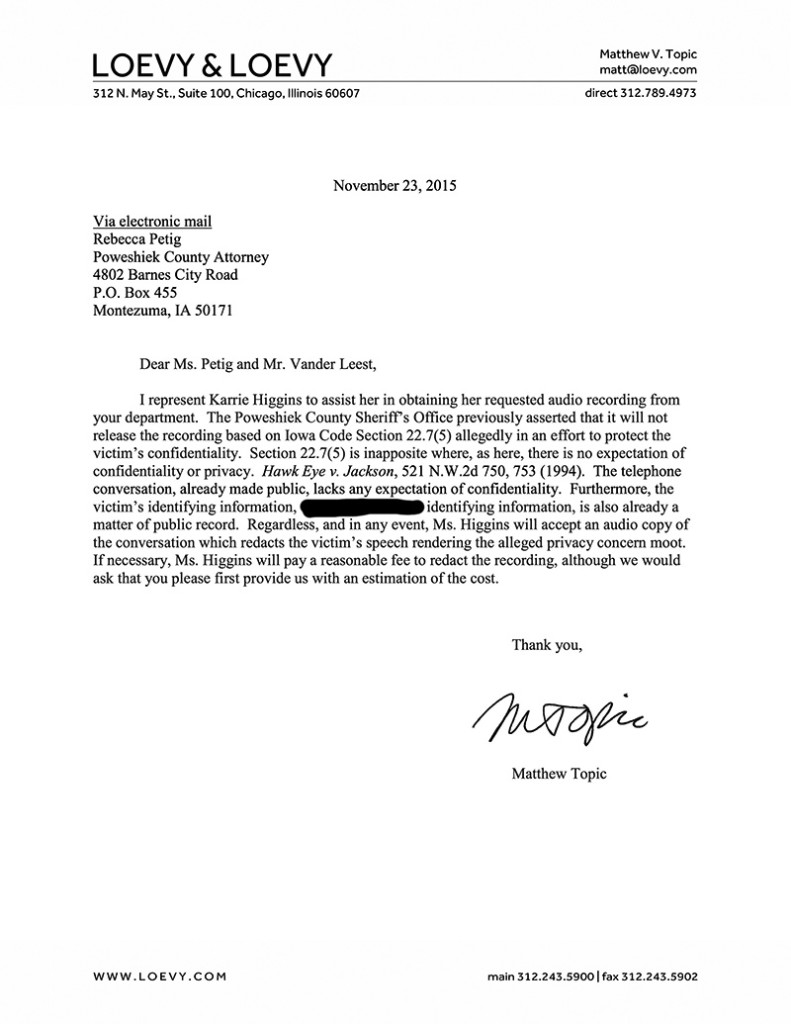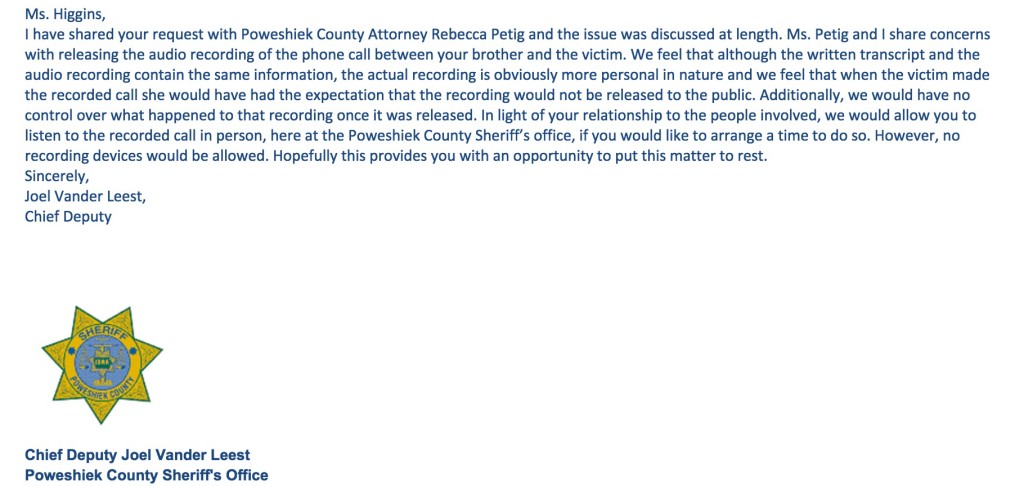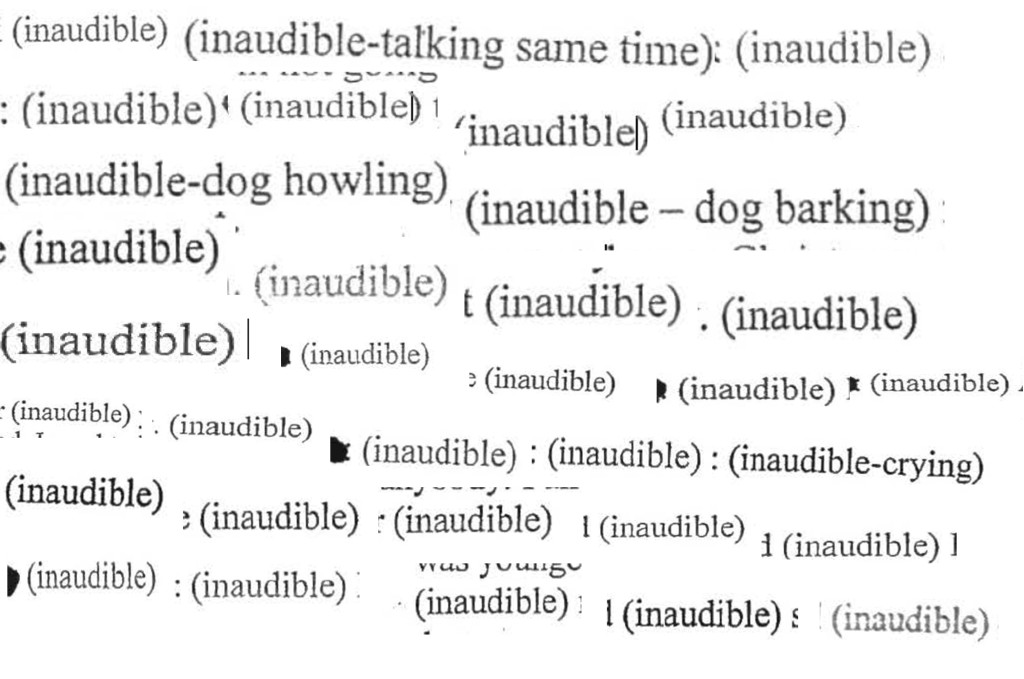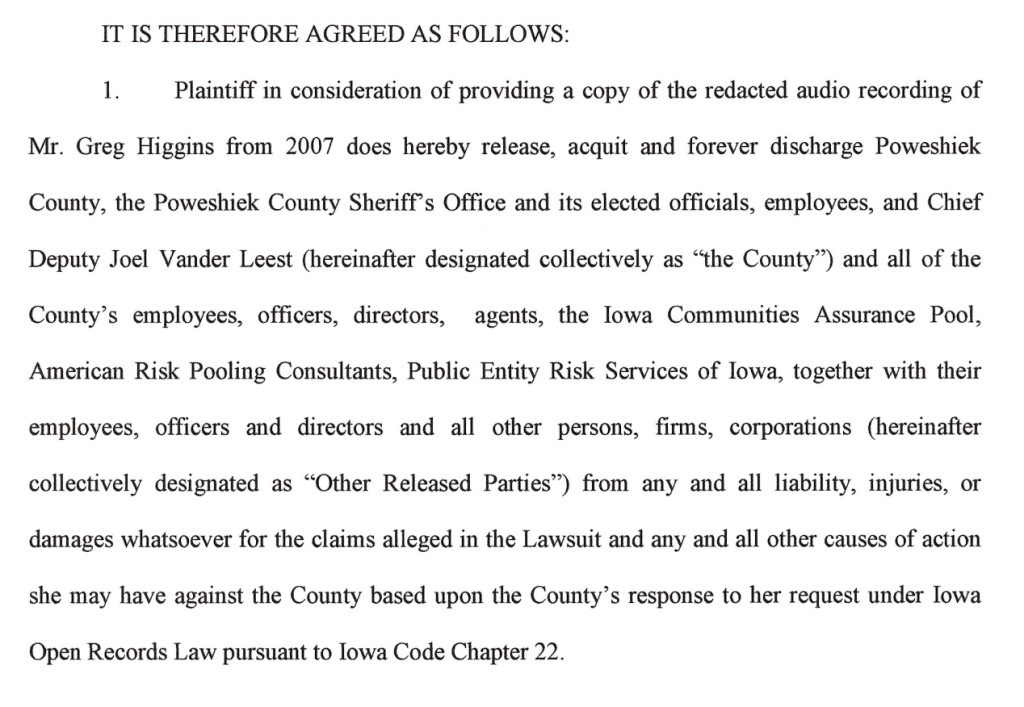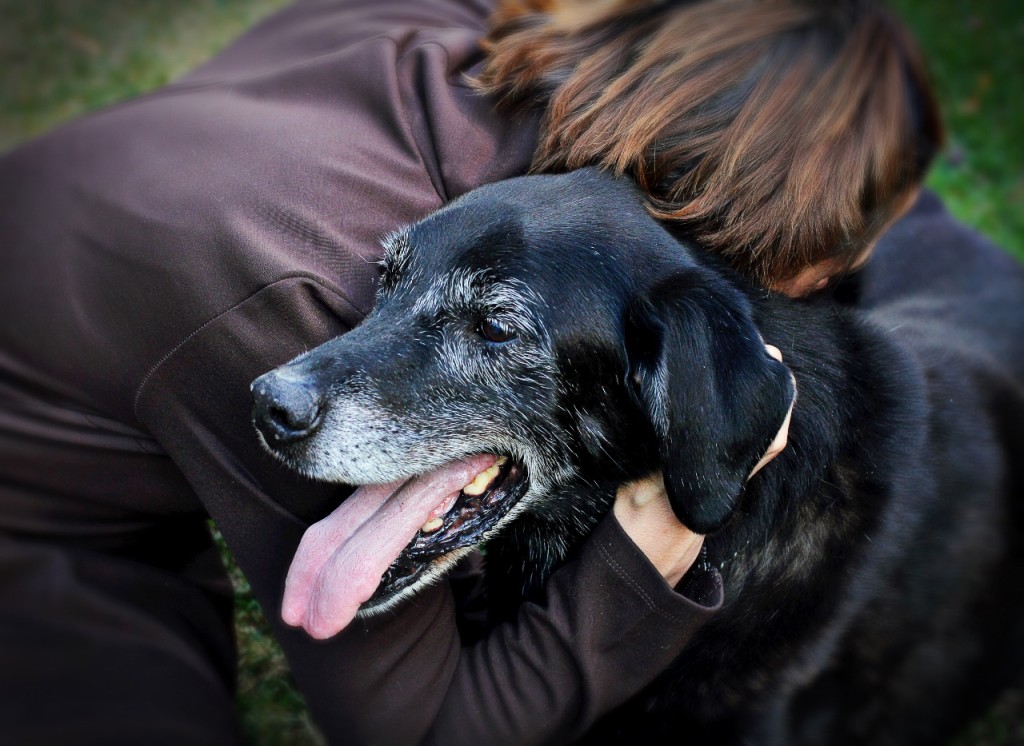
By Amy E. Robillard
I first see him as I’m scrolling through my Facebook feed on a Sunday afternoon in August. I’m taking a break from composing syllabi for the approaching semester when I see the professional photos the Humane Society has commissioned for him because they want him to get more attention.
He’s ten years old. His name is Remi.
He’s a black lab mix who isn’t getting a lot of attention because of his age, but these photos ought to do the trick. In the photos Remi is stunning. He is out in a field of wild brush and wildflowers, staring at the camera with soulful eyes, the white hairs on his muzzle granting him a look of distinction. One is a profile pic, Remi’s tongue lolling lazily out of his mouth, his face lit up with happiness and contentment. Remi is clearly a happy, beautiful dog, and my heart can’t help but ache for him having no home at ten years old.
I call Steve over to the computer so he can see the pictures. Steve is a bigger softy than I am, and I know that all I have to do is give the slightest hint of a suggestion that we adopt him, and he’ll be in. He agrees that Remi is beautiful and he says, in response to my despair at Remi’s not having a mom or a dad, “We can adopt him if you want. But can we afford it?”
“No, of course we can’t. We can’t have three dogs.”
Thinking the issue is settled, Steve goes back to the living room, where he had been reading. “But honey,” I call out. “He’s ten. And he needs a home. And he needs two sisters. And we can name him Remington Elizabeth.” My mother had a habit of giving all pets, regardless of gender, the middle name Elizabeth, also my middle name. When I was growing up, I was never just Amy to her. I was always AmyElizabeth—one word—or just Elizabeth. When I asked her why she named me Amy, she said, “Your father and I liked the name.”
Steve responds with something I cannot now remember but which was probably perfectly reasonable, and I continue to think about Remi for a good two hours. Over the next week, I tell my friends about him and I show them the beautiful professional photographs the Humane Society commissioned of him. And always I end by saying, “But we can’t. Three dogs is just too much.”
Our home is full with the two we have. Wrigley is nine and a half and Essay is six. Both are black lab mixes, and while we’re pretty sure that there’s Beagle somewhere in Essay’s ancestry, we’re not sure what Wrigley’s mixed with. Whatever it is, it has made her coat softer than a typical lab’s, her ears smaller, and her disposition as sweet as honey. Wrigley is just a good dog.
Before we lost Annabelle, my soul-mate dog, four and a half years ago, Wrigley embodied her role of the younger sister in a way that most young Labradors will. She was, in a word, a nut. Energetic and playful and beside herself with excitement at times. Blinded by the love she had for the special people in her life. More than once we had to put her in time-outs to calm her down. Once Annabelle died, it seemed that she calmed down nearly overnight. She matured into what every dog owner dreams of when they adopt a crazy puppy. Wrigley will sleep in and snuggle as long as you want her to. She’s a dream on walks. She wants nothing more than to please us and, as a result, we want nothing more than to see her eyes light up in happiness.
In early October, the Humane Society reposts the professional photos with a note saying that sweet old Remi still doesn’t have a forever home. I mention it to Steve again and I show the photos to a couple of friends who hadn’t yet heard me talk about him. They take this moment to ask Wrigley and Essay if they want a big brother. They get down close to the dogs’ mouths. “They say yes,” they tell us.
That was on a Friday. On Saturday, Steve and I are sitting in the living room together, each of us reading while the dogs sleep between us. And Remi pops into my head again. “Honey,” I say. Steve looks up. “Remi.”
“I know. We can adopt him if you want.”
“But we can’t. We can’t have three dogs.”
Pause.
“But maybe we can just go look at him,” I say.
“You know that if we go look at him, we’re gonna take him home.”
“But he’s on some kind of medication and we can’t afford that.”
“Maybe they’ll pay for his medication if we adopt him. Why don’t you call and ask?”
“I’m scared to.” I take out my phone. “Here, I’ll look it up.” I go to the Humane Society website and look again at the photos of Remi. His description says he’s on Thyrokare. I type Thyrokare into Google and see that it’s a relatively inexpensive medication. “It’s cheap. Like eleven bucks a month. We could manage that.”
Steve picks up his phone and calls the Humane Society. Tells the woman who answers that we’re interested in learning more about Remi and asks about his medications. He’s not on any others. Steve also asks if we should bring our dogs with us when we come to meet him.
When he hangs up, he tells me that she said it’s best if we just come alone. “We can always come back and get the girls later,” he says.
“Honey, you told her we’d be there shortly.”
“Yeah?”
“I’m scared. Three dogs is a lot. How’m I gonna walk three dogs?”
“You get one of those harness things that hooks two of them together.” He puts his sneakers on. It’s nearly noon.
“I’m scared that we’re gonna fall in love with him.”
“We probably will.”
“I need something in my stomach.” I grab a banana as Steve gives Wrigley and Essay each a cookie. He tells them we’ll be back soon, maybe with a brother for them.
I feel sick to my stomach. I’m shaky. I’m afraid that I’ll love him. I’m afraid that I’ll love him and then lose him too soon. “Honey, this isn’t a long-term commitment. What if we take him home and he dies in two months?”
“I know. I don’t know.” He shakes his head.
“What do I do if I need to go somewhere with all three dogs? Can I handle that?”
“Good question. I don’t know.”
“Where will he sit in the car? Is there enough room back there?”
“In the middle. It’ll be fine.”
“Remi sounds a lot like Amy. When we call him, it’ll sound like we’re calling me.”
In many ways, Steve and I are a good fit. We love so many of the same things, and two of our biggest passions—dogs and the Chicago Cubs—give us plenty to do and to share together. We’re both smart, sarcastic, and empathetic. We both love reading and are not just content but happy to stay home and read together, our dogs snoring between us. We love the same foods, hate many of the same foods, and split the housework fifty/fifty. Our worldviews are similar though not the same, leaving room for productive and sometimes testy discussions about current events.
The biggest difference between us is the way we respond to potential bad news. I immediately think the worst, catastrophizing even the smallest bump on Essay’s leg, playing out the entire scenario in my head, from hearing the terrible news to putting her down to the dreadful task of telling others about how our girl died. Pain in my side is automatically some form of incurable cancer. I learned early in life not to expect much and so this has become one of my primary defense mechanisms. I expect, always, to be disappointed or even crushed.
Steve, on the other hand, hopes for the best, often to the point of dismissing my concerns. When I worry about Wrigley not putting weight on her leg after her knee surgery, Steve assures me that she’ll be okay. She’ll come around. When I tell him that my pulse is fifty, he says that that’s the pulse of an athlete. That means I’m really healthy. Or, I say, it means I’m dying.
All of this is to say that, in Steve’s mind, there’s always room for another dog.
As we drive to the Humane Society, I say, “We’ve never had three dogs before.”
“Sure we have. We had three when we had Annabelle and Scully and Mulder,” he reminds me.
“Yeah, but that was different.” When Steve and I met, I had Annabelle, and Steve had three dogs: Kylie, Scully, and Mulder. Kylie died before I moved in with him, and then the two of us had three dogs together. But I told him before I moved in that eventually I wanted us to get to two. Three dogs is a lot, I’d said.
The drive to the Humane Society is not a long one. There’s not very much time for me to either calm down or to become more worked up, so I’m basically in the same state I was at home when we walk in and tell one of the two women behind the desk that we’re here to meet Remi. She hands us a three-page application to fill out. “There are pens on the tables,” she says. I take a pen from my purse and Steve gives me a quizzical look. “Germs,” I whisper.
For the next five minutes, I complete the form, answering everything from what kind of food we’ll feed him to how many walks a day he’ll get to which veterinarian we’ll use. Answering concrete questions with certain answers helps me feel a little better, though the young woman crying at the front desk about not being able to film somebody answering questions about the facility for a course assignment does more to distract me than the form does. I realize later that her crisis—she had come there on the only day she had access to transportation, and if she didn’t get this documentary done, she would fail her assignment, and this is why she hates living in Illinois—gives me a focal point for my own anxiety. It feels better to worry with her about this problem—one I could at this point in my life solve so easily—than to feel the nervous anticipation of meeting a dog I might fall in love with only to lose within a year.
When the worker finally opens the door to the room she’d just shown us to and Remi comes barreling in toward us, my heart sinks. I look at him and then look right back up at the worker. Steve asks her to tell us his story. “Well, he was part of an investigation—”
I interrupt her. “What does that mean?”
“It means we were called out to investigate because his owners could no longer care for him or they chose not to care for him.” She sighs. “We tell everyone who meets him that he’s old. We say ten, but we think—” and her she does the thumbs-up gesture and motions upward toward the ceiling. “He’s probably older. We’re not sure if there’s anything wrong with him or if he’ll live for two months or two years. We just want him to go to a good home for his golden years.”
“What about all of these lumps? Have any of them been tested?” Steve asks.
She shakes her head. “No. We’re not sure about them.” She’s closing the door behind her as she leaves us. “I’ll give you some time alone.”
I take Remi’s head in my hands. His eyes are cloudy. I wonder how much he can actually see. His ears are almost entirely white. His teeth are bad, much worse than what you might expect from a ten-year-old dog. I pet his spine, which feels bumpy. But it’s the lumps on his stomach that make it so hard for me. There’s no fur on his belly, and he has at least eight or ten black lumps of various sizes, some of which dangle from his middle. At first I had thought one of the dangling lumps was his penis, but it wasn’t. It was just an ugly misshapen lump that could be cancer or just fat, but it made me shake. Remi runs over to Steve, who is now sitting on the floor. Remi rolls over on his back so that his tummy is exposed, and Steve rubs it, avoiding the lumps the best he can. Remi flaps his tail happily.
Remi runs back to me, and I pet his soft fur. He’s such a happy guy.
“I don’t think I can do it, honey,” I say. “He’s just too sick. And there’s no way he’s only ten.”
He goes back to Steve, who rubs his ears and says, “You’re probably right.”
This I do not expect. I expect him to minimize what we’re both seeing, to say that he’s not that bad, that we can make it work, that he’ll be okay, that we can love him back to health.
He says, “He’s just going to need so much medical care, and we can’t afford it.” To Remi he says, “I’m sorry, boy.”
I call Remi back over to me. I hold his head in my hands again. “I love you, Remi, but we just can’t. I’m so sorry.”
I stand up. “I’ll go tell her.” Steve nods, and I leave him and Remi in the room together.
I go out to the main desk, shaking my head, tears in my eyes. “We just can’t.”
She’s got tears in her eyes, too. “I know. He’s a lot to take on.”
“He’s just so sick. He would need so much medical care. And he’s got to be older than ten.”
She’s looking at our application. “And you know, with your two dogs at home, I don’t know that I would trust him. I’m not sure how well he sees. He could easily bump into them and that wouldn’t be good for anyone.”
She is trying to make me feel better.
“He’s got his own huge room here with a big comfortable bed away from all the loud dogs. He gets three walks a day and he’s happy. It’s gonna be okay.”
I nod. I can’t say anything else.
I hear her go back to the room where Steve and Remi are. I hear her say some of the same things to Steve, about Remi’s bed and his walks and how he’s gonna be okay. Steve comes out looking as depressed as I feel.
We walk to the car slowly. He tells me he had a talk with Remi. When we get into the car, he tells me that he held him and told him about heaven. “I told him that there’s a place where there will be no more pain and he’ll get to see everybody he’s ever loved and everything will be wonderful and I’m sorry we can’t take him home with us.”
“Did you mention the beach?” We had taken the girls to Montrose dog beach in Chicago earlier in the summer and I had said that from that point on, whenever I imagined doggie heaven, I would think of that beach. It was the happiest place on earth.
“I didn’t get that far. That’s when she opened the door.”
On the drive home, we comfort one another, processing what we’ve just seen, each in our own way.
“Why don’t they start a GoFundMe to raise money for surgery for those lumps?” Steve says.
“There’s no way he’s ten. He’s got to be at least eleven, and maybe even twelve.” I say.
“He’s almost not adoptable with those lumps,” Steve says.
“Those lumps are just so awful. I guess I’m not the dog lover I thought I was.”
“Of course you are. We just couldn’t help him. He needs too much.”
“You told him about heaven.”
“Yeah. I told him he’d have no more pain and he’d always be happy. I need to go home and hug the girls.”
Years ago, when Annabelle was nine and we went through a cancer scare with her, I wrote about Wrigley, wrote that she would always be a baby, that no matter how old she got, she would always be young. I was wrong about that. Wrigley’s eyesight is deteriorating and she is showing signs of her age. She gets up in the night and seems confused about where she is. It’s killing me slowly.
It took me only a few days to realize that part of the reason I wanted to adopt Remi was that I wanted a buffer between me and the brute fact of Wrigley’s age. We could tend to Remi as the old one and thereby continue to distract ourselves from the fact of Wrigley’s aging. She would become young again by comparison. He would be our senior dog. Not Wrigley.
In this way she would not die.
This story has a happy ending for Remi. He found a forever home just a week after we met him.
And yet. I’m not as relieved as I thought I would be about his forever home. Maybe because I know that his forever isn’t going to be very long and I know that no matter how much love he gets, he will still die.
I think there’s a part of me that wants to believe we can out-love death.
But no matter how much we love the beings in our life, death will come for them or for us.
I’m scared.
When Wrigley is called home, it will sound like they’re calling me.
•••
AMY E. ROBILLARD is a writer and a teacher of writing at Illinois State University. She is a regular contributor to Full Grown People, and her essays can also be found on The Rumpus. Wrigley does not share her last name; instead, she is Wrigley Field.

 Follow
Follow

